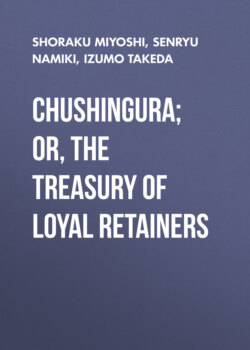Читать книгу Chushingura; Or, The Treasury of Loyal Retainers - Shoraku Miyoshi - Страница 8
На сайте Литреса книга снята с продажи.
THE IMPERIAL COURT.
ОглавлениеTable of Contents
Society during the Tokugawa period may be generally divided into four classes, the kuge, the samurai, the common people, and the lowest classes. The Emperor reigned over the country at Kyoto; and around him were the Imperial princes, some of whom were qualified to succeed to the Throne in case of failure of Imperial issue. The kuge, or Court nobles, numbered about one hundred and thirty; their titles and offices were hereditary. They were jealous of their social position. They attended daily at the Imperial Court; but their duties mostly concerned the grant and deprivation of Court rank, various ceremonies, and Court etiquette. Administrative affairs were entirely in the hands of the feudal government. All business between it and the Imperial Court was transacted by a few high officials.
The political authority over the whole nation was held by the feudal government. The feudal system was first established by Minamoto no Yoritomo towards the close of the twelfth century; at first there was no intention of replacing the Imperial Court in the government of the country; but from various causes the political and military power fell into the Shogun’s hands. The Emperor merely watched over the sacred treasures of his House and delegated political power to the feudal government. During the civil wars the fortunes of Imperial Court seriously declined; but Ota and Toyotomi, who were loyal to the Throne, presented landed estate to the Court when they had brought the country into peace. Tokugawa frequently built Imperial palaces and presented funds for household expenses; and the Imperial House was placed in easier circumstances. But it was the policy of the Tokugawa family to hold the real power over the nation. In 1614, Iyeyasu established regulations for the control of the kuge, by which although the real power of the Imperial House was diminished the principle of loyalty to the Throne and distinction of lord and subject were strictly maintained, and Tokugawa himself set the example to the nation by his reverent treatment of the Imperial Family. Although this attitude towards the Throne was a policy of Iyeyasu, it was also an expression of the innate loyalty and patriotism of the people. Thus, the dignity of the Imperial Family remained unimpaired; and it may be seen from the original cause of the Ako revenge how high the importance was attached to the reception of Imperial envoys.
